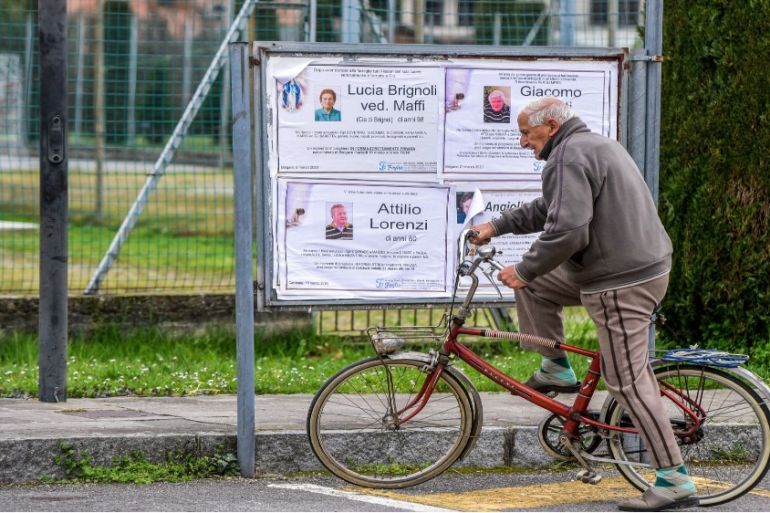For some elderly Italians, loneliness brings more fear than virus
More than 56 percent of coronavirus deaths have been people over 80, but for some, the sense of abandonment hurts most.

Renata Cafferata’s house in Lavagna, a small coastal town of some 12,000 people in northwest Italy, used to be a hive of activity.
A former beekeeper, the 87-year-old would meet her lifelong friends every day and they would share a cup of tea and a scoop of honey.
Keep reading
list of 4 itemsMexico’s teachers seek relief from pandemic-era spike in school robberies
‘A bad chapter’: Tracing the origins of Ecuador’s rise in gang violence
Why is the US economy so resilient?
But Cafferata’s house is now empty as Italy, the epicentre of the new coronavirus, remains under a national lockdown.
“My life has completely changed,” Cafferata told Al Jazeera by phone. “It’s really hard to cope with this alone.”
With more than 6,000 coronavirus deaths, the highest in the world, and more than 60,000 cases, Italy is struggling to contain the infection, which especially affects old people and those with underlying health conditions.
Cafferata has to take extra care. More than 56 percent of deaths have been people above the age of 80, according to the National Institute of Health (NIH).
“I understand that sooner or later we all have to die, but not like this, by taking this virus. I would like to live a little longer,” Cafferata said.
As well as being fearful of catching the virus, another prospect haunts her thoughts – continued loneliness.
“I very much feel my solitude,” she said.
I can't get around the fact that we don't know how to fight this virus, as we used to when we were at the front line.
Almost 28 percent of Italians above the age of 65 live alone, including approximately 1.3 million who do not have access to a social network, according to the Italian National Institute of Statistics.
“Elderly people find themselves in a particularly difficult situation,” said Fabio Sbattella, professor of emergency psychology at the Cattolica University of Milan.
“One of the emotions that prevails in this moment is confusion, as the epidemic carries a message saying that in order for the community to survive, we need to stay alone,” said Sbattella who provides assistance to people who are psychologically vulnerable to the coronavirus outbreak, from healthcare workers to the elderly.
For pensioners, changes in routine could have a huge effect on mental and physical health.
“Just not being able to do a simple walk, to visit a doctor or to see family members can create stress and disorders prompting irregular nutrition and forgetfulness in the assumption of regular medicines, hence heart diseases increase and the immune system weakens,” Sbattella said.
“We can expect a higher number of deaths among elderly people not directly linked to coronavirus, but due to changes to routine,” he explained, adding that other health complications are being left untreated as hospitals are having to prioritise the neediest.
The gloomy atmosphere of empty cities, closed shops and new rules limiting civil liberties remind some elderly people of wartime, but with a difference.
“I can’t get around the fact that we don’t know how to fight this virus, as we used to when we were at the front line,” said Lorenzo Fenoglio.
Born in 1923, Fenoglio led a unit of the Italian partisan brigades fighting against the Nazis in northern Italy during the second world war.
“Back then, we knew who was the enemy and what was needed in order to combat it,” he said. “But now, we are dealing with an invisible and elusive one.”
|
|
Confusion around the virus and with little idea of when the crisis will end generates fear and anxiety among elderly people, said Emanuela Cavedagna, who leads a team of volunteers in Cremona for AUSER, an association providing assistance to old people.
“We receive a lot of phone calls from old people who want to hear that they are not alone as they fear being abandoned in a moment where they don’t know how to handle their daily life,” said Cavedagna, who explained that for some, the fear of abandonment was worse than worries around coronavirus.
“They are seeking a network of solidarity and friendship around them as people today don’t know each other as they used to,” Cavedagna said, adding that the absence of such a network could lead to depression.
As social distancing is advised, several grassroots movements have emerged to build bridges between the elderly and the rest of society.
Students are volunteering to deliver groceries and medicines from pharmacies; local council members have established dedicated phone-lines to offer a chat to those in need; people in apartment complexes are organising shifts to ensure that those who are alone are always looked after, while cinemas are offering old archives online for free to fill up the long day.
People seem to be working together against loneliness, rediscovering a sense of community.
This is a typical phase during a crisis. It is what psychologists refer to as the “honeymoon”.